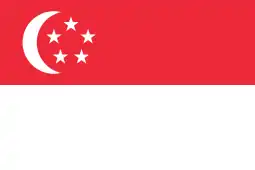 | |
 | |
| Formation | June 15, 2020 |
|---|---|
| Purpose | Intergovernmental cooperation in advancing the appropriate use of artificial intelligence |
| Location |
|
Region served | Global |
| Fields | Artificial intelligence |
Members |
Invited members |
Key people | Steering Committee Co-Chairs:
Yoichi Iida Inma Martinez |
Main organ | A council and a steering committee |
| Affiliations | Hosted by the Organisation for Economic Co-operation and Development (OECD) |
| Website | gpai |
| [1] | |
The Global Partnership on Artificial Intelligence (GPAI, pronounced "gee-pay") is an international initiative established to guide the responsible development and use of artificial intelligence (AI) in a manner that respects human rights and the shared democratic values of its members. The partnership was first proposed by Canada and France at the 2018 44th G7 summit, and officially launched in June 2020.[2] GPAI is hosted by the Organisation for Economic Co-operation and Development (OECD).
GPAI seeks to bridge the gap between theory and practice by supporting research and applied activities in areas that are directly relevant to policymakers in the realm of AI.[3] It brings together experts from industry, civil society, governments, and academia to collaborate on the challenges and opportunities presented by artificial intelligence.[3][4]
History
The Global Partnership on Artificial Intelligence was announced on the margins of the 2018 G7 Summit by Canadian Prime Minister Justin Trudeau and French President Emmanuel Macron. It officially launched on June 15, 2020[2] with fifteen founding members: Australia, Canada, France, Germany, India,[5] Italy, Japan, Mexico, New Zealand, the Republic of Korea, Singapore, Slovenia, the United Kingdom, the United States, and the European Union.[6][7]
The Organisation for Economic Co-operation and Development (OECD) hosts a dedicated secretariat to support GPAI's governing bodies and activities.[6] UNESCO joined the partnership in December 2020 as an observer.[8][6] On November 11, 2021, Czechia, Israel and few more EU countries also joined the GPAI,[9] bringing the total membership to 25 countries.[10] Since the November 2022 summit, the list of members stands at 29.[11]
Austria, Chile, Finland, Malaysia, Norway, Slovakia and Switzerland were invited. The seven, however, are pending membership approval.
Membership
The following 29 members of the GPAI are:[11]
 Argentina
Argentina.svg.png.webp) Australia
Australia.svg.png.webp) Belgium
Belgium Brazil
Brazil.svg.png.webp) Canada
Canada Czech Republic
Czech Republic Denmark
Denmark France
France Germany
Germany India
India Ireland
Ireland Israel
Israel Italy
Italy Japan
Japan Mexico
Mexico Netherlands
Netherlands New Zealand
New Zealand Poland
Poland Republic of Korea
Republic of Korea Senegal
Senegal Serbia
Serbia Singapore
Singapore Slovenia
Slovenia Spain
Spain Sweden
Sweden Turkey
Turkey United Kingdom
United Kingdom United States
United States European Union
European Union
Invited members:
Organization
GPAI's experts collaborate across several Working Groups themes: Responsible AI (including an ad-hoc subgroup on AI and Pandemic Response), Data Governance, Future of Work, and Innovation & Commercialization.[3] GPAI's Working Groups are supported by two Centres of Expertise: one in Montreal that supports the first two Working Groups, and one in Paris that supports the latter two.[3] It also has a Steering Committee, the elected chair of which has also been to date elected chair of the Multi Stakeholder Group (MEG).[12] These chairs have been:
- Jordan Zed and Baroness Joanna Shields (Shields, MEG chair; 2020-2021),
- Joanna Shields and Renaud Vedel (Shields, MEG chair; 2021-2022),
- Yoichi Iida and Inma Martinez (Martinez, MEG chair; 2023-2024)
GPAI has a rotating presidency and host (much like the G7). The presidencies to date have been:
References
- ↑ "GPAI Website". gpai.ai. Retrieved September 15, 2022.
- 1 2 Can, Muhammed; Kaplan, Halid (2020-12-17). "Transatlantic partnership on artificial intelligence: realities, perceptions and future implications". Global Affairs. 6 (4–5): 537–557. doi:10.1080/23340460.2020.1854049. ISSN 2334-0460.
- 1 2 3 4 "About - GPAI". gpai.ai. Retrieved 2021-02-15.
- ↑ Banifatemi, Amir; Miailhe, Nicolas; Buse Çetin, R.; Cadain, Alexandre; Lannquist, Yolanda; Hodes, Cyrus (2021), Braunschweig, Bertrand; Ghallab, Malik (eds.), "Democratizing AI for Humanity: A Common Goal", Reflections on Artificial Intelligence for Humanity, Lecture Notes in Computer Science, Cham: Springer International Publishing, vol. 12600, pp. 228–236, doi:10.1007/978-3-030-69128-8_14, ISBN 978-3-030-69128-8, S2CID 233329670, retrieved 2021-02-15
- ↑ "India becomes a founding member of Global Partnership on Artificial Intelligence". Digit. 2020-06-19. Retrieved 2021-02-15.
- 1 2 3 Clarke, Laurie (2020-06-16). "Global Partnership on Artificial Intelligence founded by UK and other nations". NS Tech. Archived from the original on 2020-10-04. Retrieved 2021-02-15.
- ↑ "Trudeau stresses digital tech's potential — and dangers — at global AI summit". CityNews Toronto. Retrieved 2021-02-15.
- ↑ "UNESCO joins Global Partnership on Artificial Intelligence as observer". UNESCO. 2020-12-10. Archived from the original on June 8, 2021. Retrieved 2021-02-16.
- ↑ Eichner, Itamar (2021-11-11). "Israel has joined the GPAI forum". YNet (in Hebrew). Retrieved 2021-11-11.
- ↑ "GPAI Website". 2020-09-06. Retrieved 2021-02-15.
- 1 2 "Community". GPAI. Retrieved 28 December 2022.
- ↑ "Steering Committee". GPAI. Retrieved 28 December 2022.